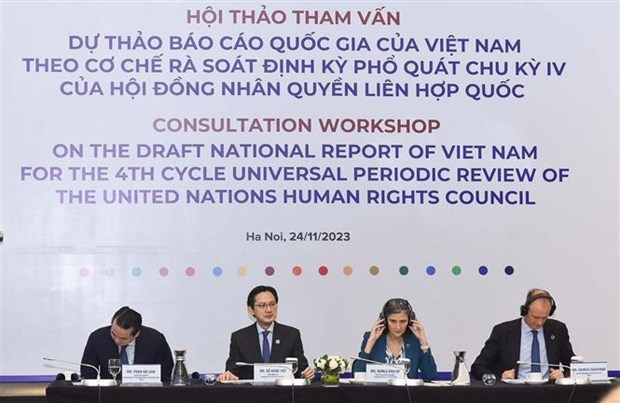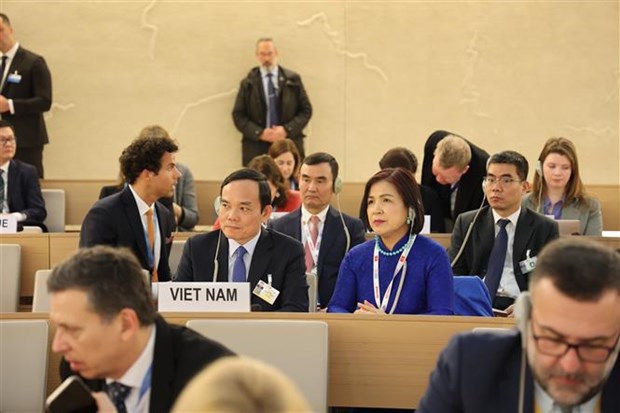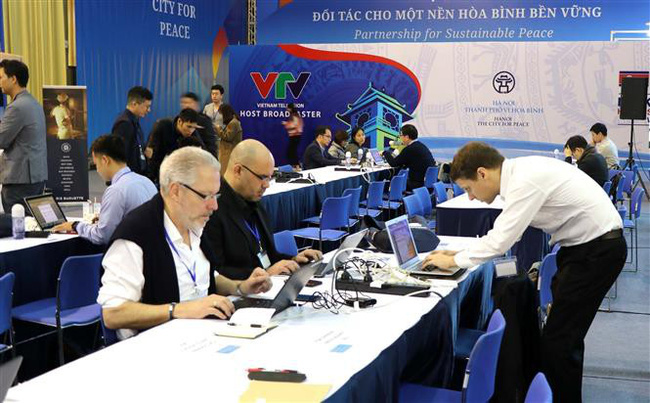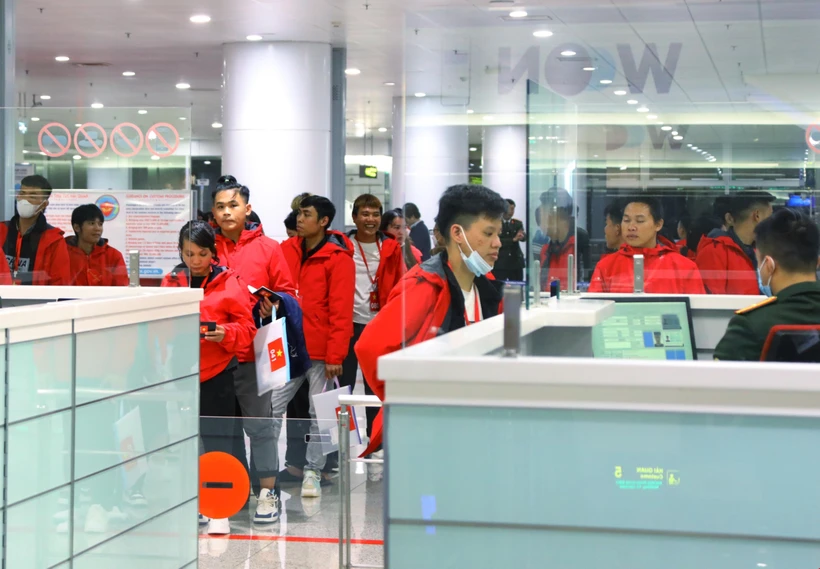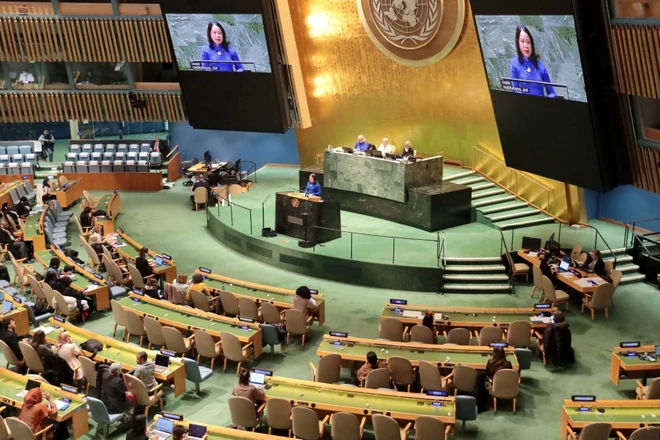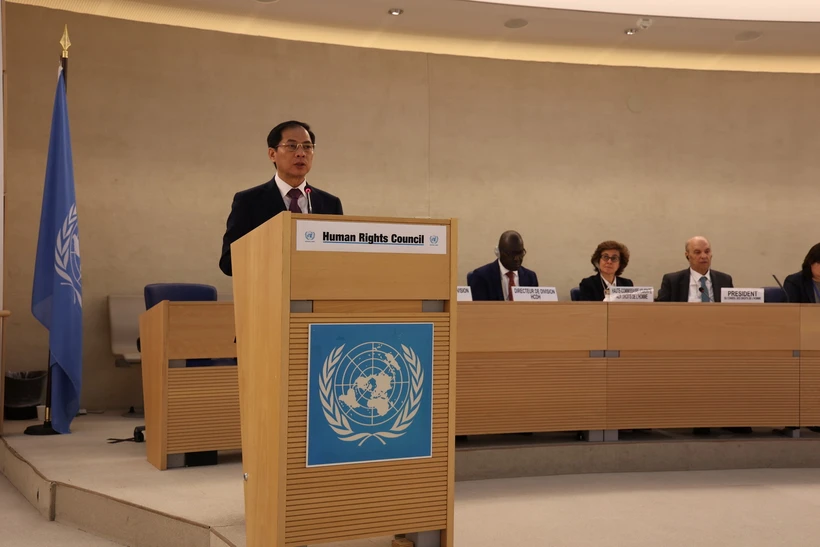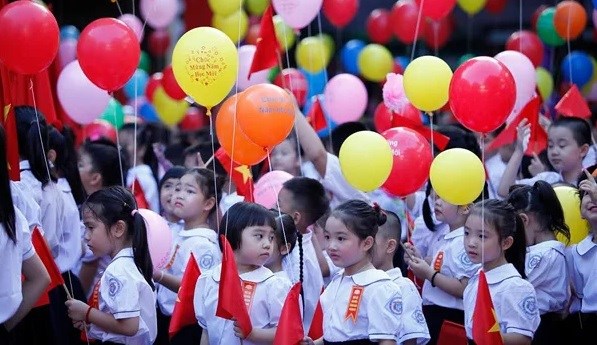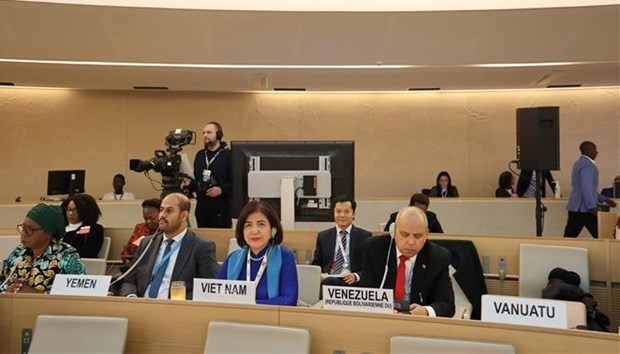Deputy Foreign Minister Do Hung Viet chairs the Consultation Workshop on the Draft National Report of Viet Nam for the 4th Cycle Universal Periodic Review of the UN Human Rights Council. (Photo: VNA)
On this occasion, Deputy Minister of Foreign Affairs Do Hung Viet has penned an article reflecting on Viet Nam's first year as an UNHRC member for the 2023-2025 term. The Viet Nam News Agency (VNA) is honoured to present the article as follows:
The task of assuming the position as an UNHRC member for the 2023-2025 term has been stepped up since the early days, with the UNHRC's initial activities in 2023 witnessing active participation and coordination among various agencies in the inter-sectoral working group and press agencies, leaving a hallmark and having a ripple effect not only within the UNHRC but also across various other areas of work.
1. In 2023, the global and regional landscapes underwent profound changes. While peace, cooperation, and development remained major trends, they faced the most significant challenges since the Cold War era, particularly as strategic competition among major powers intensified across the board. The armed conflicts and hotspots erupted in various regions worldwide, increasing in both number and severity, with multidimensional manifestations and diverse forms. The global economy experienced slow, uneven and uncertain recovery, with various macroeconomic risks. The progress towards achieving Sustainable Development Goals (SDGs) slowed down since non-traditional security challenges such as climate change, food security, water security, inequalities, and the adverse effects of digital transformation directly impacted people's livelihoods, living quality and enjoyment of rights worldwide. These intertwined factors posed numerous challenges, exacerbating politicisation and limiting cooperation space in many human rights issues, while also highlighting the need for dialogue and collaboration to address common concerns of the international community regarding human rights, including through the activities of the UNHRC.
In 2023, the world commemorated the 75th anniversary of the Universal Declaration of Human Rights (UDHR) and the 30th anniversary of the Vienna Declaration and Programme of Action (VDPA), providing an important opportunity for the international community to look at the achievements and challenges ahead in safeguarding the universal values and strong commitments to protecting and promoting human rights enshrined in these documents.
Against this backdrop and the expectations of the global community, in 2023, the UNHRC actively fulfilled its role as the most important human rights body within the UN system, effectively implementing an extensive agenda covering 10 items closely aligned with the current global concerns. However, it also experienced significant friction, even direct confrontation among countries and groups of countries. Also in 2023, the UNHRC operated at a high intensity, completing the largest volume of work since its establishment in 2006, with 180 formal plenary meetings during the three regular sessions and one special session, reviewing 231 reports, adopting 110 resolutions (about two-thirds of which were adopted by consensus), 41 decisions, and one presidential statement, along with numerous meetings of Working and Expert Groups, with the Universal Periodic Review (UPR) Working Group considering and adopting reports from 42 countries. Additionally, to promote their priorities and contribute to the UNHRC's activities, about 450 sideline events were organised by countries during the regular sessions, covering diverse topics.
2. On October 11, 2022, the UN General Assembly elected Viet Nam along with 13 other countries as members of the UNHRC for the 2023-2025 term. Following the success of Viet Nam's tenure as a non-permanent member of the UN Security Council (2020-2021), this event held significant importance in Viet Nam's efforts to realise the foreign policy set forth by the 13th National Party Congress and Directive 25-CT/TW of the Party Central Committee's Secretariat on enhancing and elevating multilateral diplomacy until 2030. It demonstrated Viet Nam's increasingly high stature and credibility on the international stage, as well as international recognition of Viet Nam's policies, efforts, and achievements in ensuring human rights.
Viet Nam assumed this role while making utmost efforts to develop its socio-economy, ensure livelihoods, improve the people’s lives, fulfil international commitments regarding human rights amid numerous challenges both at home and abroad. Therefore, Viet Nam's membership in the UN Human Rights Council for the 2023-2025 term has garnered significant attention from the international community. On the one hand, our achievements, efforts, commitments and needs for cooperation in protecting and promoting human rights have been widely recognised.
On the other hand, some individuals, organisations, and international politicians still maintained subjective views about the situation in Viet Nam and our capacity to fulfill the role as an UNHRC member.
3. In that context, Viet Nam has actively joined the council and left its imprints right from the first days with many initiatives that are suitable to the country’s priorities and the common interest of the world, receiving applause from the international community.
At the 52nd session of the UNHRC in March-April 2023, Deputy Prime Minister Tran Luu Quang introduced the initiative on celebrating the 75th anniversary of the Universal Declaration of Human Rights (UDHR) and the 30th anniversary of the Vienna Declaration and Programme of Action (VDPA).
Viet Nam led a core group of 14 co-authors (Viet Nam, Austria, Bangladesh, Belgium, Bolivia, Brazil, Chile, Costa Rica, Fiji, India, Panama, Romania, South Africa, and Spain) to draft a resolution, and organised consultations for the document, which was approved by the UNHRC by consensus and co-sponsored by 121 states – a “record” of the council in recent years.
The resolution stresses the leading role of countries in ensuring human rights, the recognition of women’s participation, the role of international cooperation and solidarity, and the respect for diversity and inclusiveness in promoting and protecting human rights and in taking part in HRC activities.
This initiative of Viet Nam has made an important contribution to conveying great messages, raising awareness and determination to act of countries and the international community in implementing the goals and principles of human rights outlined in these two fundamental declarations, while simultaneously promoting the position and role of the council and UN human rights mechanisms.
To continue showing its leading role in building a series of resolutions regarding human rights protection amid climate changes, at the 53rd session of the UNHRC in June-July 2023, Viet Nam, along with Bangladesh and the Philippines, drafted a resolution on promoting livelihoods amid climate changes, which was adopted by the council by consensus with 80 co-sponsors (Resolution 53/6).
At the 53rd and 54th sessions, Viet Nam continued to work with countries and international organisations such as the International Labour Organisation (ILO), the World Health Organisation (WHO) and the Global Alliance for Vaccines and Immunisation (GAVI) to promote initiatives on “vaccination and human rights,” and "anti- discrimination, violence, and gender-based harassment in the workplace" in the form of international discussions on the sidelines of meetings, and built joint statements at the council.
Viet Nam’s ideas, which match major concerns about human rights currently, have received support and positive contributions from states. For example, the joint statement on vaccination and human rights drafted by Viet Nam at the council's 54th session drew the participation and support from more than 60 countries. The statement was topical in the context that the COVID-19 pandemic still posed many long-term effects, and many developing countries and many population groups had yet to have full access to COVID-19 vaccines as well as other basic vaccines for expanded immunisation.
4. Viet Nam has also engaged deeply in the council's common work, promoting dialogues and cooperation at the council in the spirit of “respect and understanding, dialogue and cooperation, all rights, for all people”. Viet Nam has made more than 80 national statements at the UNHRC's meetings on ensuring human rights in aspects of concern to the international community such as sustainable development, climate change response, migration, gender equality promotion, ensuring housing rights, food rights, cultural rights, development rights, protecting vulnerable groups, while participating in 50 joint statements on diverse topics of ASEAN, Non-Aligned Movement, Like-Minded Group of Developing Countries (the group has a diverse composition, including 134 developing countries representing 80% of the world's population and 70% of UN members, with the main purpose of coordinating and promoting the common interests and priorities of developing countries at the UN in general and the UNHRC in particular), Francophone and several other inter-regional groups. Viet Nam has shown high level of responsibility in implementing the main obligations and interests of a member state during the process of negotiating and voting to pass draft resolutions.
Viet Nam has given a constructive approach in human rights-related issues that still have many differences, are politicised, and have many frictions at the council such as the situation of specific countries (Ukraine, Russia, Palestine, Sudan, etc.), as well as relationship between development and human rights, reproductive health and sexual education, LGBT rights, and religious tolerance.
On the one hand, Viet Nam has made contributions to the common struggle of developing countries to protect the principle of not politicising and not using human rights issues to interfere in the internal affairs of sovereign states. On the other hand, the country has listened to and respected the needs of cooperation and technical assistance of other countries, promoting cooperation and dialogue so that the council can act to meet the legitimate demands of states in the field.
5. The footprints that Viet Nam have left right from the first year it takes on the role as a member of the UN Human Rights Council for the 2023-2025 term have positive impacts on other areas of the human rights foreign affairs work.
Viet Nam’s contributions at the council have helped the international community get a deeper insight into the country’s efforts and commitment to protecting and promoting human rights, thereby strengthening cooperation with countries and international organsiations.
According to Acting UN Resident Coordinator in Viet Nam Ramla Khalidi, through showing its positive and responsible role at the UNHRC, promoting initiatives, especially its proposed Resolution 52/19, together with seriously carrying out the commitments under the Universal Periodic Review (UPR) and welcoming the UN Special Rapporteur on the right to development (November 2023), Viet Nam has demonstrated its pioneering role in protecting and promoting human rights. She made the comment while delivering opening remarks at the Consultation Workshop on the Draft National Report of Viet Nam for the 4th Cycle Universal Periodic Review of the UN Human Rights Council.
In 2023, large partners increased discussions with Viet Nam regarding cooperation contents at the council through existing mechanisms or organisation of new activities. Being a member of the council, Viet Nam was able to garner countries' support to fight against distortion of Vietnamese situation at the UN’s mechanisms and forums.
Deputy Prime Minister Tran Luu Quang attend the 52nd session of the UN Human Rights Council. (Photo: VNA)
6. Although formidable challenges are on the horizon, it can be said that the first year as a member of the council is a success for Viet Nam with many milestones. The results were sparked by the close direction and direct engagement of the senior Vietnamese leaders in the council’s activities as well as the participation and effective contributions from competent ministries, agencies and members of working groups to support the Ministry of Foreign Affairs’ coordination work and the Viet Nam Mission to the UN, World Trade Organisation and other organisations in Geneva (Switzerland).
Vietnamese agencies positively and actively joined hands to study, forecast and give advice to competent authorities on the country’s participation and reaction at the council, and particularly contributed to initiatives promoted at the council, meeting not only Viet Nam’s interest and priorities but also the international community’s concerns.
Therefore, the initiatives that Viet Nam made at the council garnered wide support from foreign countries. Besides, members of the interdisciplinary working group showed their positive role in the information and communications work, with the country’s activities at the council covered more widely and attractively by both domestic and foreign press than the previous tenure of 2014-2016.
2024 is a pivotal year for the 2023-2025 term, with many key activities such as presentation and dialogue on the National Report under the 5th Cycle Universal Periodic Review. The country will continue to promote initiatives and priorities, especially those on climate change and human rights, together with mobilising countries' support for its first re-election for the 2026-2028 term.
With strong resolve, solidarity, and close coordination of the whole political system under the close direction of the Party and State leaders, Viet Nam will make important contributions at the council and leave footprints in the year and beyond, helping build a strong, comprehensive, modern and professional diplomacy while elevating the multilateral foreign relations under the essence of the Resolution of the 13th National Party Congress and the Party Central Committee Secretariat’s Directive No. 25-CT/TW./.
Source: VNA

